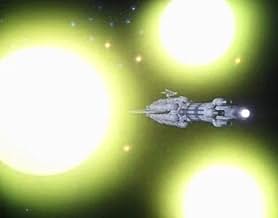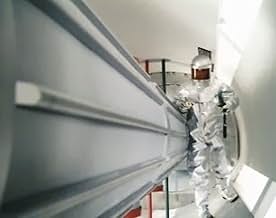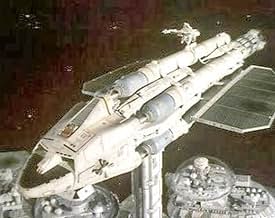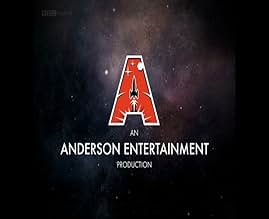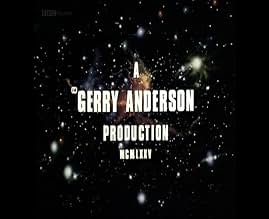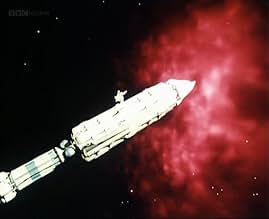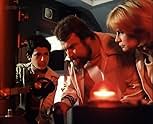Ajouter une intrigue dans votre langueThe crew of the lightship Altares are lost in space when the craft is struck by a meteor shower and goes out of control.The crew of the lightship Altares are lost in space when the craft is struck by a meteor shower and goes out of control.The crew of the lightship Altares are lost in space when the craft is struck by a meteor shower and goes out of control.
Histoire
Le saviez-vous
- AnecdotesOriginally commissioned to create a child-friendly introduction to Albert Einstein's special relativity theory in the form of an exciting action-adventure, Anderson and Byrne conceived The Day After Tomorrow as a television pilot for a potential series and gave it an alternative episode title of "Into Infinity". Ultimately, Anderson's limited budget prevented additional episodes from being made.
- GaffesThe G-forces generated when the when the Altares is accelerating to light-speed would have quickly crushed the crew (even the couple seconds of acceleration shown on the ship's instruments would have generated double the highest G-force ever experienced by a human).
- ConnexionsEdited into Outer Touch (1979)
- Bandes originalesFlight 76, Pt. 2
Written and performed by Walter Murphy
Commentaire en vedette
The term 'classic' is often problematic. For some months one television channels used to run a series called CLASSIC EASTENDERS, which basically consisted of a rerun of all the old episodes of the British soap opera. In that case, the term was simply a euphemism for 'old.'
The same could also be said for Gerry Anderson's Seventies sci-fi adventure, that in truth is much less well-known than SPACE 1999 (1975-7). Centering on a space-ship traveling beyond all known boundaries of earth, this series features an Anglo-British cast including Nick Tate, Joanna Dunham, and Martin Lev and Katherine Levy as a pair of rather precocious children with cut-glass British accents. Also involved in the mission is Brian Blessed, giving (for him) an understated performance as the chief engineer/ general factotum. The entire episode is narrated by Ed Bishop, who found radio fame at the same time in the BBC's cycle of Philip Marlowe adaptations.
The story follows a familiar sci-fi path; the family blast off into space, face an impossible danger as they move inexorably towards incineration, escape in the nick of time, and hopefully return to Earth. The only snag is that they do not return ... rather than going to Earth, they are faced with a new peril that they have to deal with in the next episode.
The designs (by Reg Hill) are very Seventies in tone - all white suits, white laminate and computers that need to be fed all the time with information (shades of Audrey in Roger Corman's LITTLE SHOP OF HORRORS (1960)). The script - with an uncredited writer - is workmanlike, showing the virtues of the nuclear family and the need for it to stay together as protection against adversity. True to the spirit of the times - especially in Britain - the crew are all white: multiculturalism was not an issue at that time.
It is interesting to note that the director was Charles Crichton, the author of such seminal Ealing comedies as THE LAVENDER HILL MOB (1951). He directs in a competent manner, with a feeling for drama, but the episode as a whole seems rather anonymous, shorn of those little directorial touches - for example, the telling close-up, or the feeling for narrative pace - that distinguished his earlier work. THE DAY AFTER TOMORROW is not exactly bad, but it is hardly distinguished either.
The same could also be said for Gerry Anderson's Seventies sci-fi adventure, that in truth is much less well-known than SPACE 1999 (1975-7). Centering on a space-ship traveling beyond all known boundaries of earth, this series features an Anglo-British cast including Nick Tate, Joanna Dunham, and Martin Lev and Katherine Levy as a pair of rather precocious children with cut-glass British accents. Also involved in the mission is Brian Blessed, giving (for him) an understated performance as the chief engineer/ general factotum. The entire episode is narrated by Ed Bishop, who found radio fame at the same time in the BBC's cycle of Philip Marlowe adaptations.
The story follows a familiar sci-fi path; the family blast off into space, face an impossible danger as they move inexorably towards incineration, escape in the nick of time, and hopefully return to Earth. The only snag is that they do not return ... rather than going to Earth, they are faced with a new peril that they have to deal with in the next episode.
The designs (by Reg Hill) are very Seventies in tone - all white suits, white laminate and computers that need to be fed all the time with information (shades of Audrey in Roger Corman's LITTLE SHOP OF HORRORS (1960)). The script - with an uncredited writer - is workmanlike, showing the virtues of the nuclear family and the need for it to stay together as protection against adversity. True to the spirit of the times - especially in Britain - the crew are all white: multiculturalism was not an issue at that time.
It is interesting to note that the director was Charles Crichton, the author of such seminal Ealing comedies as THE LAVENDER HILL MOB (1951). He directs in a competent manner, with a feeling for drama, but the episode as a whole seems rather anonymous, shorn of those little directorial touches - for example, the telling close-up, or the feeling for narrative pace - that distinguished his earlier work. THE DAY AFTER TOMORROW is not exactly bad, but it is hardly distinguished either.
- l_rawjalaurence
- 14 déc. 2014
- Lien permanent
Meilleurs choix
Connectez-vous pour évaluer et surveiller les recommandations personnalisées
Détails
- Date de sortie
- Pays d’origine
- Site officiel
- Langue
- Lieux de tournage
- société de production
- Consultez plus de crédits d'entreprise sur IMDbPro
Contribuer à cette page
Suggérer une modification ou ajouter du contenu manquant

Lacune principale
By what name was The Day After Tomorrow (1975) officially released in Canada in English?
Répondre
